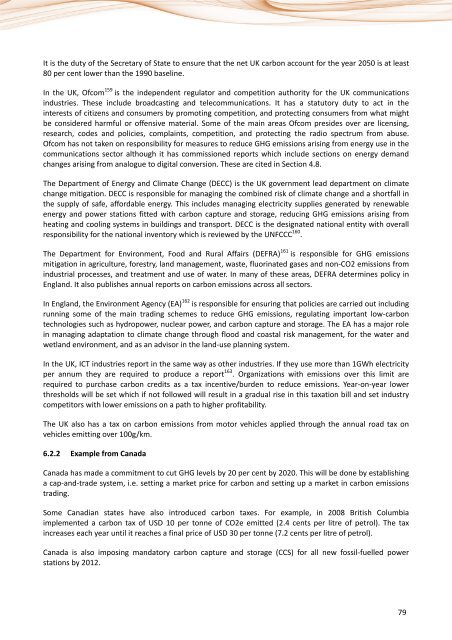Information and communication technologies (ICTs) and ... - ITU
Information and communication technologies (ICTs) and ... - ITU
Information and communication technologies (ICTs) and ... - ITU
Create successful ePaper yourself
Turn your PDF publications into a flip-book with our unique Google optimized e-Paper software.
It is the duty of the Secretary of State to ensure that the net UK carbon account for the year 2050 is at least<br />
80 per cent lower than the 1990 baseline.<br />
In the UK, Ofcom 159 is the independent regulator <strong>and</strong> competition authority for the UK <strong>communication</strong>s<br />
industries. These include broadcasting <strong>and</strong> tele<strong>communication</strong>s. It has a statutory duty to act in the<br />
interests of citizens <strong>and</strong> consumers by promoting competition, <strong>and</strong> protecting consumers from what might<br />
be considered harmful or offensive material. Some of the main areas Ofcom presides over are licensing,<br />
research, codes <strong>and</strong> policies, complaints, competition, <strong>and</strong> protecting the radio spectrum from abuse.<br />
Ofcom has not taken on responsibility for measures to reduce GHG emissions arising from energy use in the<br />
<strong>communication</strong>s sector although it has commissioned reports which include sections on energy dem<strong>and</strong><br />
changes arising from analogue to digital conversion. These are cited in Section 4.8.<br />
The Department of Energy <strong>and</strong> Climate Change (DECC) is the UK government lead department on climate<br />
change mitigation. DECC is responsible for managing the combined risk of climate change <strong>and</strong> a shortfall in<br />
the supply of safe, affordable energy. This includes managing electricity supplies generated by renewable<br />
energy <strong>and</strong> power stations fitted with carbon capture <strong>and</strong> storage, reducing GHG emissions arising from<br />
heating <strong>and</strong> cooling systems in buildings <strong>and</strong> transport. DECC is the designated national entity with overall<br />
responsibility for the national inventory which is reviewed by the UNFCCC 160 .<br />
The Department for Environment, Food <strong>and</strong> Rural Affairs (DEFRA) 161 is responsible for GHG emissions<br />
mitigation in agriculture, forestry, l<strong>and</strong> management, waste, fluorinated gases <strong>and</strong> non-CO2 emissions from<br />
industrial processes, <strong>and</strong> treatment <strong>and</strong> use of water. In many of these areas, DEFRA determines policy in<br />
Engl<strong>and</strong>. It also publishes annual reports on carbon emissions across all sectors.<br />
In Engl<strong>and</strong>, the Environment Agency (EA) 162 is responsible for ensuring that policies are carried out including<br />
running some of the main trading schemes to reduce GHG emissions, regulating important low-carbon<br />
<strong>technologies</strong> such as hydropower, nuclear power, <strong>and</strong> carbon capture <strong>and</strong> storage. The EA has a major role<br />
in managing adaptation to climate change through flood <strong>and</strong> coastal risk management, for the water <strong>and</strong><br />
wetl<strong>and</strong> environment, <strong>and</strong> as an advisor in the l<strong>and</strong>-use planning system.<br />
In the UK, ICT industries report in the same way as other industries. If they use more than 1GWh electricity<br />
per annum they are required to produce a report 163 . Organizations with emissions over this limit are<br />
required to purchase carbon credits as a tax incentive/burden to reduce emissions. Year-on-year lower<br />
thresholds will be set which if not followed will result in a gradual rise in this taxation bill <strong>and</strong> set industry<br />
competitors with lower emissions on a path to higher profitability.<br />
The UK also has a tax on carbon emissions from motor vehicles applied through the annual road tax on<br />
vehicles emitting over 100g/km.<br />
6.2.2 Example from Canada<br />
Canada has made a commitment to cut GHG levels by 20 per cent by 2020. This will be done by establishing<br />
a cap-<strong>and</strong>-trade system, i.e. setting a market price for carbon <strong>and</strong> setting up a market in carbon emissions<br />
trading.<br />
Some Canadian states have also introduced carbon taxes. For example, in 2008 British Columbia<br />
implemented a carbon tax of USD 10 per tonne of CO2e emitted (2.4 cents per litre of petrol). The tax<br />
increases each year until it reaches a final price of USD 30 per tonne (7.2 cents per litre of petrol).<br />
Canada is also imposing m<strong>and</strong>atory carbon capture <strong>and</strong> storage (CCS) for all new fossil-fuelled power<br />
stations by 2012.<br />
79

















